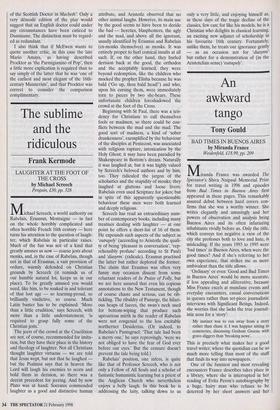The sublime and the ridiculous
Frank Kermode
LAUGHTER AT THE FOOT OF THE CROSS by Michael Screech Penguin, £30, pp. 328 Michael Screech, a world authority on Rabelais, Erasmus, Montaigne — in fact on the whole horribly complicated and often horrible French 16th century — here turns his attention to the question of laugh- ter, which Rabelais in particular raises. Much of the fun was not of a kind that greatly amuses us now — coarse jests about monks, and, in the case of Rabelais, though not in that of Erasmus, a vast provision of ordure, warmly defended on Christian grounds by Screech (it reminds us of our humble natural lot, keeps us in our place). To be greatly amused you would need, like him, to be soaked in and tolerant of that lost age — so learning-proud, so brilliantly vindictive, so coarse. Much Latin banter has to be explained: 'More than a little erudition,' says Screech, with more than a little understatement, 'is required to grasp fully some of the Christian jests.'
The jeers of the crowd at the Crucifixion are not, of course, recommended for imita- tion, but they have their place in the history and theology of laughter. Not all Christians thought laughter virtuous — we are told that Jesus wept, but not that he laughed but the Psalmist says that in heaven the Lord will laugh his enemies to scorn and hold them in derision, so there was a decent precedent for jeering. And by now Plato was at hand; Socrates commended laughter as a good and distinctive human attribute, and Aristotle observed that no other animal laughs. However, its main use by the good seems to have been to deride the bad — heretics, blasphemers, the ugly and the mad, and above all the ignorant, usually identified by Erasmus and Rabelais (ex-monks themselves) as monks. It was entirely proper to hurl comical insults at all such. If, on the other hand, they hurled derision back at the good, the orthodox and the acceptably learned, they were beyond redemption, like the children who mocked the prophet Elisha because he was bald (`Go up, thou bald head!') and who, upon his cursing them, were immediately torn to pieces by two she-bears. These unfortunate children foreshadowed the crowd at the foot of the Cross.
Beginning with St Paul, there was a ten- dency for Christians to call themselves fools or madmen, so there could be con- flicts between the mad and the mad. The good sort of madness, a kind of 'sober drunkenness', exemplified by the behaviour of the disciples at Pentecost, was associated with religious rapture, intoxication by the Holy Ghost; it may have been parodied by Shakespeare in Bottom's dream. Naturally it was laughed at, but it was highly valued by Screech's beloved authors and by him, too. They ridiculed the jargon of the scholastics and the stupidity of monks; they laughed at gluttons and loose livers; Rabelais even used Scripture for jokes; but in spite of this apparently questionable behaviour these men were both learned and deeply religious.
Screech has read an extraordinary num- ber of contemporary books, including many treatises dealing with laughter — at one point he offers a short-list of 16 of them. He expounds such aspects of the subject as `eutrapely' (according to Aristotle the quali- ty of being 'pleasant in conversation', 'rep- rehensibly profane' according to St Paul) and 'cliasynn' (ridicule). Erasmus practised the latter but rather deplored the former. The claim that Erasmus was often very funny may occasion dissent from some reluctant readers of In Praise of Folly, but we are here assured that even his copious annotations to the New Testament, though of course chaste and serious, can be rib- tickling. The ribaldry of Panurge, the hilari- ous heaps of faeces, the swan's neck used for bottom-wiping that produce such uproarious mirth in the reader of Rabelais were not congenial to the less excitable northerner Desiderius. (Or indeed, to Rabelais's Pantagruel: 'That tale had been a merry one,' he says reprovingly, were we not obliged to have the fear of God ever before our eyes.' But the censure doesn't prevent the tale being told.) Rabelais' position, one infers, is quite like that of Professor Screech, who is not only a Fellow of All Souls and a scholar of fantastic humanistic learning but a priest of the Anglican Church who nevertheless enjoys a belly laugh. In this book he is addressing the laity, talking down to us only a very little, and enjoying himself as, in these days of the tragic decline of the classics, few can; for like his models, he is a Christian who delights in classical learning, an exciting new adjunct of scholarship in his favourite 16th century. Fortunately, unlike them, he treats our ignorance gently — as an occasion not for `diasyrm' but rather for a demonstration of (in the Aristotelian sense) 'eutrapely'.


























































 Previous page
Previous page